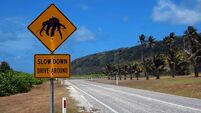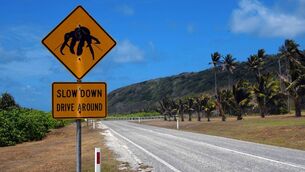The working day of some birds may be up to an hour longer than ‘normal’ due to artificial light

Brent Pease, assistant professor in SIU Carbondale’s School of Forestry and Horticulture, displays a BirdWeather PUC (portable universe codec), a weatherproof device with microphones, Wi-Fi, GPS, environmental sensors and AI. Picture: Russell Bailey
In a dark time, the eye begins to see, I meet my shadow in the deepening shade — Theodore Roethke.
Darkness, like silence, is in short supply nowadays; perpetual light shines upon us throughout both day and night. About 80% of people worldwide, and almost all Europeans, live under artificial light. We no longer spend the hours of darkness tucked up in our beds. The health implications of this light revolution are debated, with one in three of us sleep-deficient and drivers nodding off behind the wheel.








